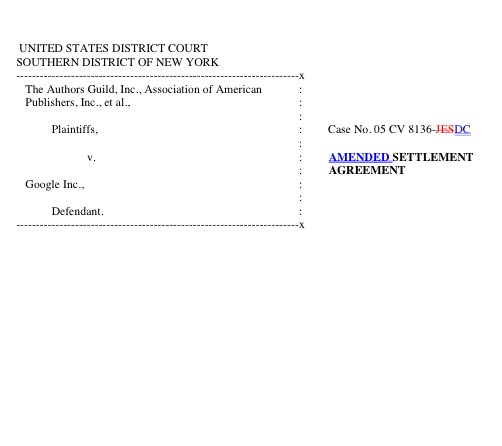Google Revises Book Settlement - Will It Be Enough?
- by Michael Stillman

Google offers an amended settlement.
By Michael Stillman
Google has filed its revised settlement that, if approved, would allow the internet giant to provide access to millions of copyrighted old books online. Next comes the period where objectors can object, after which the court will/may reach a decision. The next hearing is scheduled for February, so a resolution will not come before then.
After Google began scanning old books, many still under copyright, and making them available online, they were sued by groups representing authors and publishers. Google reached a settlement with these parties, one that essentially allowed them to make these books available to the public with sales proceeds being split 63%-37% (Google receiving the 37%). However, many of the copyright holders were unknown, leading others to claim the author and publisher groups had no right to settle this dispute on their behalf. This led to a host of parties objecting to the settlement. Some object that authors who do not want to participate in the settlement must opt out, rather than requiring Google to obtain copyright holders' approval first (opt in). Other parties, including competitors Amazon, Microsoft and Yahoo, objected that Google was obtaining a monopoly on these old books. Finally, the government, concerned Google was obtaining a monopoly, joined the opposition. The result was that the court called for a revised settlement between Google and the author and publisher groups. That revised settlement was filed two weeks ago.
The revised settlement has erased objections by some of the parties, while others remain as adamantly opposed as ever. Among them is the Open Book Alliance, the consortium that includes several Google competitors, which stated, "At its heart, this is the same flawed agreement with the same terminal shortcomings as before." What remains to be seen is how the 800-pound gorilla, also known as the U.S. Department of Justice, will react to the revised terms. Here are a few of the changes in the revised settlement.
Google removed a large block of opponents by agreeing not to make the complete text of foreign books not copyrighted in the U.S. available. Only books from England, Canada, and Australia, besides the U.S., will be made available in full. However, some may still object to Google's continuing to scan such books and make a small "snippet" available for viewing.
The revised settlement allows (but does not require) the Book Rights Registry, an independent group that will monitor access to these books and payment for their use, to provide libraries with more than one free-access terminal. Originally, Google offered public libraries only one terminal of free access to the books. This change should soften, though probably not eliminate, library opposition, as many libraries remained concerned about the cost of accessing the service beyond the guaranteed one free terminal.
The revision seeks to provide greater protection for those copyright holders who remain unknown, and do not file claims for their share of income from use of their books. Originally, they were to be represented by a publisher (who also represents known claimants), and after five years, the unknowns' share of income would have been distributed to the knowns. Now, the unknowns will have their own, independent representative, up to 25% of their income for the next five years can be expended searching for these unknown copyright holders, and the remaining money will be kept for them for a second five years, and only then, and with the court's approval, may be distributed to charities that promote literacy.
Google has agreed not to include books which contain more than 20% musical notation in their database. The original settlement put that percentage at 50%. This appears to have removed the objections of some music publishers.
The issue of competition has been partially addressed, but as to whether sufficiently so to resolve the major roadblock, government opposition, remains to be seen. Certain potentially anticompetitive pricing parameters have been removed, as has a requirement that the independent registry monitoring use of these books extend the terms of any better deals negotiated by Google competitors to Google. However, the revised agreement does not guarantee that anyone other than Google will have the right to offer books from unknown copyright holders without their express approval. This could still afford Google a monopoly. Resolving this issue is a tricky procedure, since it in effect alters copyright law. Such action really should be taken by the legislature to resolve these issues so Google, and anyone else who wishes, can go forward with this very important service. Such legislation would guarantee open competition, and hopefully resolve concerns of one company having absolute control of "orphan" (unknown copyright holder) books, with the ability to set any price they wish.
The court has set February 4, 2010, as the final date to file objections to the revised settlement, with the next hearing to be held on February 18.